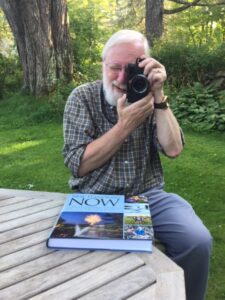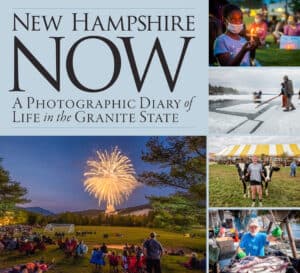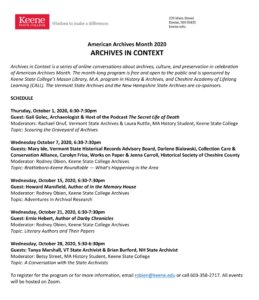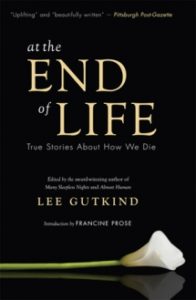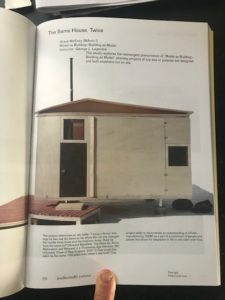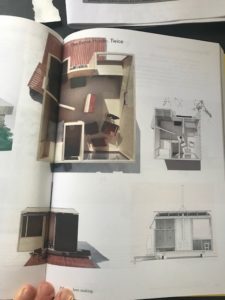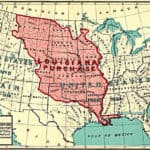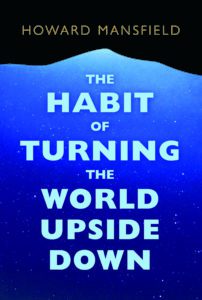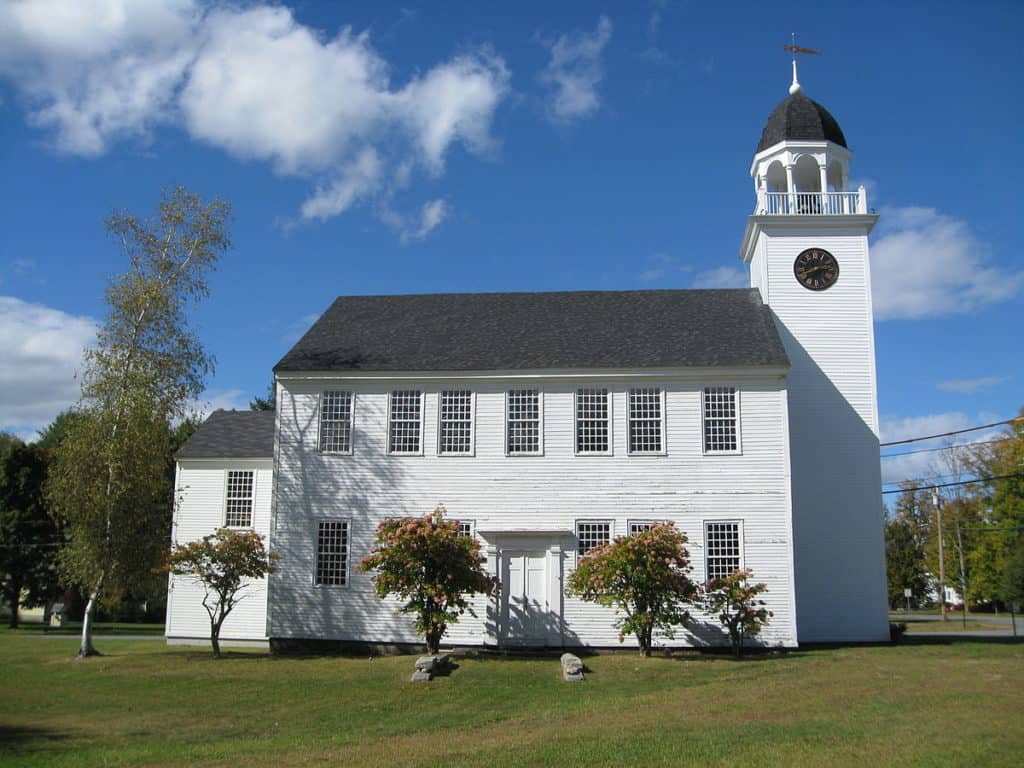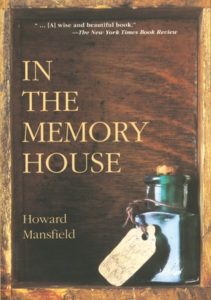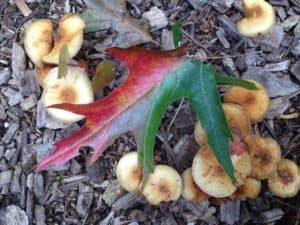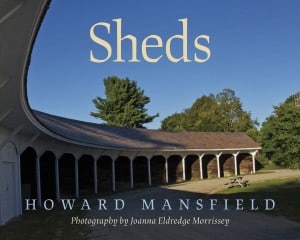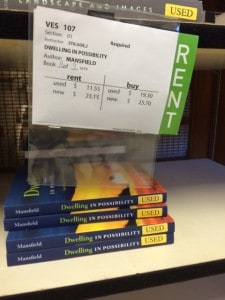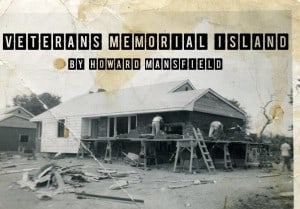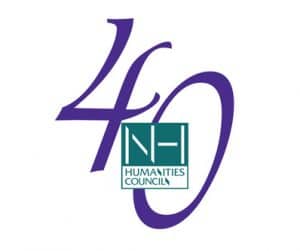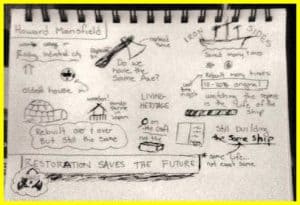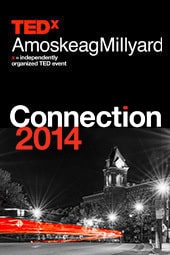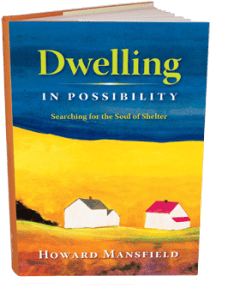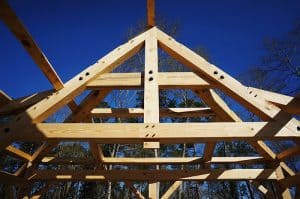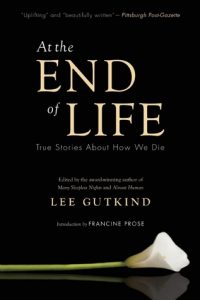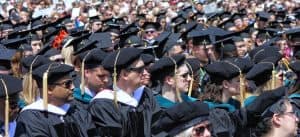April, 2024
Today’s the pub date for my new book, I Will Tell No War Stories: What Our Fathers Left Unsaid About World War II. Read an excerpt and an interview in the Military Times, or Air Force Times, Army Times, Navy Times, and Marine Corps Times.
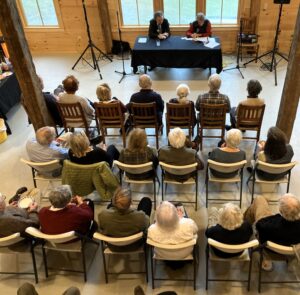
A big thank you to Chet Atkins and Jessica Stern for hosting the book launch party for my new book, I Will Tell No War Stories, and to Mel Allen, editor of Yankee magazine, for interviewing me. It was a wonderful evening.
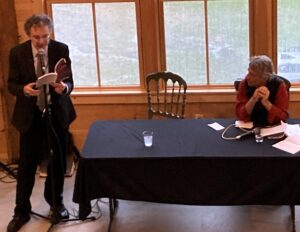
Here’s how Mel introduced me:
Before we begin I want to take a moment to tell about how special it is to be an editor and work with a writer for more than three decades. We would have met in the late 1980s since Yankee published Howard’s first piece for the magazine in 1988. We learned we had each been staffers on the Daily Orange, the campus daily of Syracuse University. And we had both graduated from the Newhouse School of Journalism, though over a decade apart.
Ever since, Howard’s stories, fueled by his insatiable curiosity and idiosyncratic way of seeing the world, stand out from any I know….
He wrote about why small museums matter, that subject is in his DNA; but also about the terror of driving rotaries and a small town garage mechanic, and the keeper of the Hancock town clock.
His storytelling curiosity led him to join a Civil War reenactment, and to go to auctioneering school, and more recently to tell one of the most unforgettable stories Yankee has ever published: “I Will Not Leave,” about Vermont farmer Romaine Tenney who vowed to not be pushed from his land by a highway eminent domain order.
What connects these and so many others, is there is not one — not one — I would not want to read again, or publish again.
And I also want to also say something about pull quotes. One way I judge a story is how many lines and observations I circle. Pull quotes are those words highlighted and set off to the side of stories that serves as spotlights and compel a reader to keep going, there is something memorable going on here. With a Howard Mansfield story I never stop circling. This week, as I read the proof of the book, I kept circling line after line. Observation after observation. Just one example: “A veteran is another word for survivor.”
I Will Tell No War Stories is a book you will not forget. And I will tell you, some descriptions of what happens to young airmen in combat will be difficult. But you will never view a Veterans Parade or drive past a VFW or Legion Hall without thinking for a moment about those people in your life who once served during a war. In one way or another, they are also Pincus Mansfield.
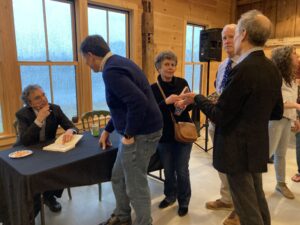
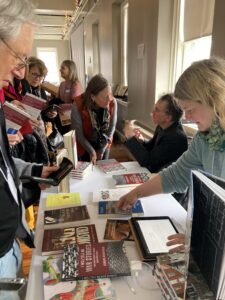 Signing books after giving a talk at the annual meeting of Historic Harrisville. Thank you Historic Harrrisville, you are a great, forward-thinking group.
Signing books after giving a talk at the annual meeting of Historic Harrisville. Thank you Historic Harrrisville, you are a great, forward-thinking group.
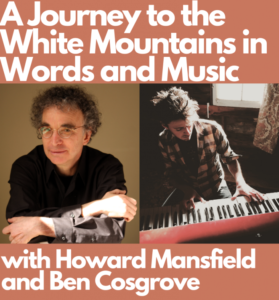
A Journey to the White Mountains has been nominated for a Boston/New England Emmy Award. Elizabeth Myer of the SALT Project is the Producer/Director of the documentary film that was shown on New Hampshire and Vermont Public Television. The film is based on the concert of music and words by Ben Cosgrove and Howard Mansfield.
January, 2023
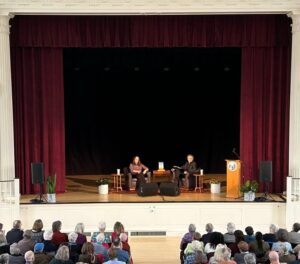
It was a great honor and a joy to interview Heather Cox Richardson on stage as the Toadstool Bookshop welcomed Heather back to Peterborough. Thanks to Emerson Sistare and his great Toadstool staff, sound wizard Ben Rogers, Sarah Bauhan and Henry James from Bauhan Publishing, and ace filmmaker Oriana Camara. The video of the complete interview will be posted on YouTube.
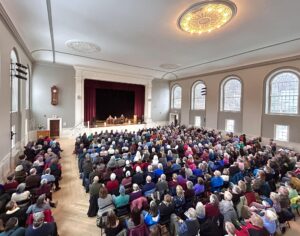
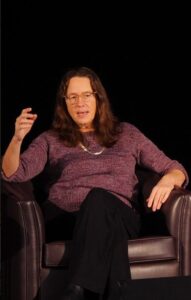
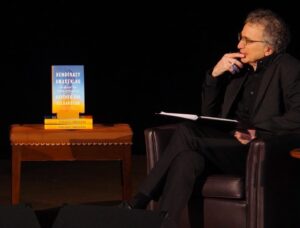
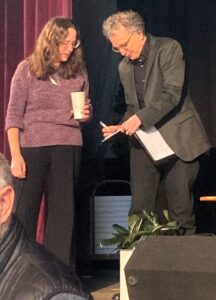
And here’s the link to the complete video of the on stage with Heather Cox Richardson. Here’s the link: http://tinyurl.com/ywkudktf
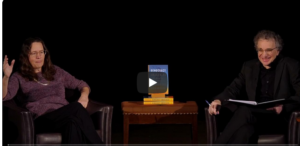
November, 2023
It was a pleasure to return to the Infrastructure Junkies podcast for a third time to discuss “Who Sacrifices, Who Benefits, Who Decides?” In this Season 4 finale, I explore “The Last Medieval Claim” by recounting some of the earliest battles for American soil which occurred in the courts across the ocean, and involved people who never set foot in North America. Then the conversation turns to “The Pipeline in the Neighborhood” where the human effects of a massive infrastructure project are once again examined. My thanks to hosts Dave Arnold and Kristen Short Bennett. Listen here.
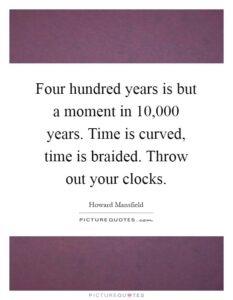
Something called PictureQuotes.com has posted two quotes from my books at their website. The first, above, is from Turn & Jump and the second, below, from In the Memory House. I know nothing about how these quotes were selected. It’s interesting to see what pops up online.
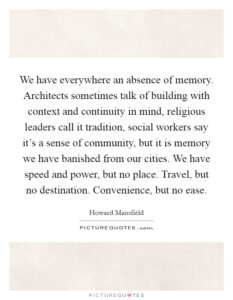
October, 2023
Here’s a first look at the cover for my new book to be published in April by Lyons Press.

When I grew up, World War II was omnipresent and hidden. This was also true of my father’s time in the Air Force. Like most of his generation, it was a rule with him not to talk about what he’d seen at war. “You’re not getting any war stories from me,” he’d say. Cleaning up the old family house the year before he died, I was surprised to find a short diary of the bombing missions he had flown. Some of the missions were harrowing. I began to fill in the details, and to be surprised again, this time by a history I thought I knew.
I Will Tell No War Stories is about undoing the forgetting in our family and in a society that has hidden the horrors and cataclysm of a world at war. Some part of that forgetting was necessary for the veterans, otherwise how could they come home, how could they find peace?
I Will Tell No War Stories is, finally, about learning to live with history, a theme I have explored in some of my earlier books like In the Memory House and The Same Ax, Twice.
And here’s the first comment for I Will Tell No War Stories. Mark Bowden, the author of 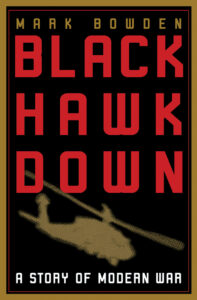 Black Hawk Down: A Story of Modern War, offers his advance praise:
Black Hawk Down: A Story of Modern War, offers his advance praise:
In this moving and absorbing book, Howard Mansfield tries to understand his father’s steadfast, lifelong refusal to discuss his service as a 19-year-old B-24 machine gunner during World War 2. There was guilt, of both the survivor and the killer, a deep sense of war’s depravity, but mostly there was the shadow of a terror so intense and sustained that not even a long life was enough to escape. To speak of it was to re-enter it. It was, as Mansfield’s research reveals, and as his father knew, an experience so overwhelming that words diminished it, as if trying to draw a frame around the infinite.
The audio book of Turn & Jump: How Time and Place Fell Apart is now available on Amazon, Audible and iTunes. It’s read by the author who is joined in the last chapter by Abenaki scholar and storyteller Marge Bruchac. She reads her own part, and sings a little.
You can hear a short sample of the introduction here.
September, 2023
I’m looking forward to this:
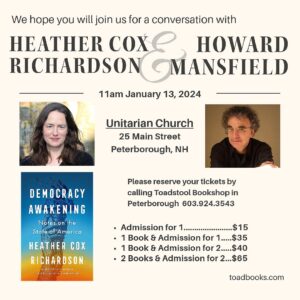
From the Toadstool Bookshop in Peterborough, NH:
We are thrilled to announce Heather Cox Richardson will now be in-conversation with local author Howard Mansfield on Saturday, January 13th, 2024 at 11am. Due to such enthusiasm and interest, we have moved the event to the Unitarian Church and have made it a ticketed event. To reserve your seats, please call our Peterborough store at 603-924-3543 and pay over the phone via card. In the case of seating availability on the day of, we will have tickets for sale at the door. We are beyond excited to welcome Heather Cox Richardson to Peterborough and hope you will join us for this special occasion!

Close to 25 years ago, I opened my book The Same Ax, Twice: Restoration & Renewal in as Throwaway Age by talking about a farmer’s ax, igloos, the Shinto shrine Ise. and the USS Constitution.
What do they all have in common?
They are preserved by being continually rebuilt. That farmer had rebuilt his ax many times. He said that he had the same ax. I wrote:
“So, does that farmer have the same ax? Yes. His ax is an igloo, and a Shinto shrine. He possesses the same ax even more than a neighboring farmer who may have never repaired his own ax. To remake a thing correctly is to discover its essence.
“A tool has a double life. It exists in the physical sense, all metal and wood, and it lives in the heart and the mind. Without these two lives, the tool dies. The farmer who restored his ax has a truer sense of that ax. He has the history of ax building in his hands. Museums are filled with cases of tools that no one knows how to use anymore. A repaired ax is a living tradition.
“We have our own Ise Shrine, our igloo, a U.S. government-sized farmer’s ax, the U.S.S. Constitution, Old Ironsides, the oldest commissioned warship afloat in the world.”
This week I was looking up Old Ironsides as we prepared to record the audio book for The Same Ax, Twice, and I found that the website for the USS Constitution Museum had quoted from my book. They were celebrating the spirit of a living, breathing preservation. Give it a read: “Rebuilt, Preserved, Restored – USS Constitution Across the Centuries.”
And order the book, ebook, or (soon) the audio book.
July, 2023
My books have been honored with the Ruth & James Ewing Arts Awards for Literary Arts. This is what the presenter said:
Author Howard Mansfield lets curiosity guide his story-telling and peppers that work with questions and observations that make one smile, pause to consider or uncomfortably confront…. Howard’s writing pursues truth through its inquisitiveness, particularly our contradictions.
“It’s the city upon the hill and the slave labor to build it,” he says, writing about our history. “It’s winner-take-all greed and great acts of philanthropy and charity. It’s the founders of the country committing us to this great course, but, also, they were the slave-holders.
“You’ve got to take all of that together, and it becomes your inheritance to pry that apart.”
Howard is a winner of a Ruth and James Ewing Arts Award for Literary Arts. The recognition comes from his many books but also from the manner by which he explores his subjects, forcing us, in so many ways, to equally face that which we choose to discuss and that which we purposely leave unsaid.
When he moved to New Ipswich, he visited the local historical society and explored the musty, disheveled collections there. It became the basis of his first book, “In the Memory House.”
“In that book, I’m very interested in the stories we choose to tell and the stories we don’t tell,” he says. “Essentially how we choose our ancestors, who gets the displays in the museums, who gets the holidays, who has the names on the road and the landscape and what stories are we leaving out.” There are valuable observations in what Howard writes and even more wisdom in his questions.
June, 2023
I’m honored to receive a Ruth and James Ewing Arts Award. They have chosen one other writer this year to receive the award: Sy Montgomery.
May, 2023

I am pleased to return to the Infrastructure Junkies podcast to discuss two more chapters from The Habit of Turning the World Upside Down. On my first visit I discussed the attempts to drain the Great Dismal Swamp and told sad, important story about Romaine Tenney losing his farm, and his life, to an interstate highway. Listen here.
This time we delve into “The Land of Many Uses” — our national forests. From the mass destruction of old growth American timber throughout the 19th and 20th centuries to the creation of national forests, these national treasures may not be as safe as we would like them to be. We then head to New Hampshire’s North Country for the story “My Roots are Deeper than your Pockets” — when one’s land is more important than any amount of money, even if the landowner lacks sufficient financial resources. Listen here or here.
April, 2023

I’ll be giving the keynote talk at an important conference May 7 about saving our cultural heritage from the rising seas. Many of our most treasured historic sites, like the Statue of Liberty, the Kennedy Space Center, and the country’s first permanent English settlement, Jamestown, are imperiled.
Sarah Sutton, a museum consultant, says: “If you’re within two to seven feet of sea level today, then saltwater is in your future this century. If, like many early cultural sites, yours was built on land that was once wetland, then saltwater is already in your basement. What to do? Document, protect, salvage, move, or abandon?”
More info: https://historyabovewater.org/2023-portsmouth/
The Habit of Turning the World Upside Down is now available as an audio book, read by the author. Listen to a sample here.
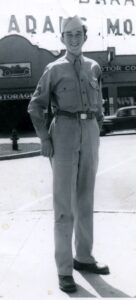
Introducing my new book:
I Will Tell No War Stories. To be published by Lyons Press next year, Spring 2024.
When I grew up, World War II was omnipresent and hidden. This was also true of my father’s time in the Air Force. Like most of his generation, it was a rule with him not to talk about what he’d seen at war. “You’re not getting any war stories from me,” he’d say. Cleaning up the old family house the year before he died, I was surprised to find a short diary of the bombing missions he had flown. Some of the missions were harrowing. I began to fill in the details, and to be surprised again, this time by a history I thought I knew.
I Will Tell No War Stories is about undoing the forgetting in our family and in a society that has hidden the horrors and cataclysm of a world at war. Some part of that forgetting was necessary for the veterans, otherwise how could they come home, how could they find peace?
I Will Tell No War Stories is, finally, about learning to live with history, a theme I have explored in some of my earlier books like In the Memory House and The Same Ax, Twice.
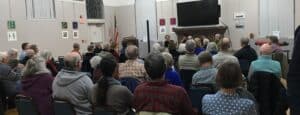
Thank you to everyone who came out to see the premiere of the Salt Project’s film of our show, A Journey to the White Mountains. Next: You can see the film on NH PBS on April 6, and the show itself – live! – April 14 at the Colonial Theater’s Showroom in Keene. Tickets: https://tinyurl.com//3yykn5yr
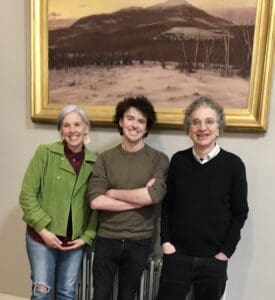
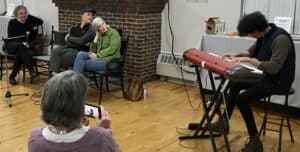
February, 2023
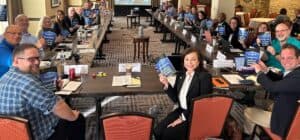
This is gratifying and surprising. This is a meeting of the Governing Council of the International Right of Way Association holding up my book – The Habit of Turning the World Upside Down – a book that, in places, criticizes how their profession has implemented Eminent Domain, taking property for roads, powerlines, and pipelines. But here they are, willing to hear me out, to learn. Thank you to Dave Arnold for the photo and for interviewing me on the Infrastructure Junkies podcast that he co-hosts with Kristen Short Bennett. Here’s that episode: https://tinyurl.com/yc3rhtv3
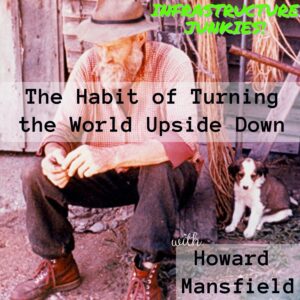
Infrastructure Junkies is “an informative and sometimes irreverent podcast for those interested in eminent domain, right of way land acquisition, or infrastructure development. Topics for discussion frequently include condemnation of real property for public use, just compensation, [and] the Uniform Relocation Act.”
This is probably not a podcast you’d stumble upon. It’s about, and by, the professionals who make eminent domain happen – the lawyers, and relocation specialists in what they call “the right of way industry.” When people are fighting an impending pipeline or powerline, these folks can easily be cast as the villains.
But the podcast by two lively hosts, Dave Arnold and Kristen Short Bennett, shows the truer, more complex picture. They believe in building new roads and pipelines. They believe that “one of the things that makes this nation such a wonderful place to live is our fabulous infrastructure system. We have reliable electricity, we have running water … safe and reliable airlines, and rails, and we have roads to take us anywhere we want to go,” as co-host Arnold says. But they also know that to have your home taken by the state, no matter how good the intentions, can be a wrenching and emotional loss. “What we as right of way professionals do not always realize, however, is that every single project comes with a hidden price to humanity,” says Arnold. In some episodes lawyers on both sides of taking a property, debate, contesting the entire process and the vague, but all important phrase “just compensation.”
Recently I was honored to lead off the fourth season. We discussed my book, The Habit of Turning the World Upside Down. This is what the hosts said:
Dave Arnold: I took Mansfield’s book off the shelf and “I began reading and it changed my life and my perspective…. The Habit of Turning the World Upside Down is now required reading for anybody who wants to come join my [legal] team.”
Kristen Short Bennett: “I’ve spent 16 years in the right of way industry. I have relocated over a thousand displacees. I have sat around countless kitchen tables explaining relocation benefits, listening to family histories, getting to know people from all walks of life. I pride myself on my ability to build rapport with landowners and displaces, and I’d even consider myself to be empathetic with their situations. But this book changed me as well. It shifted my perspective on what we do and the people who are impacted.
“I’ll give you an example, and this might even be a little controversial. I have stated on this very podcast, I think multiple times, that we don’t take people’s property, we buy it. And I would like to today retract that statement. We absolutely do take it. We take it and they do not have a choice or a say in the matter. Oh, we pay them fair market value, sure. But we take it. And I don’t need to lie to myself anymore about what I do to sleep at night because I think that we do is important and it’s necessary. But it is not work that his done without tremendous sacrifice by people who did not choose to be part of the process.”
Listen to the episode of Infrastructure Junkies.
January, 2023

An ebook of Skylark: The Life, Lies and Inventions of Harry Atwood is now available at Amazon.

November, 2022
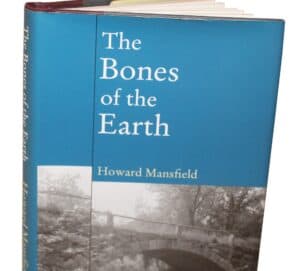
The Bones of the Earth is now available as an audio book, read by the author, on Audible, iTunes or Amazon. Listen to a sample.
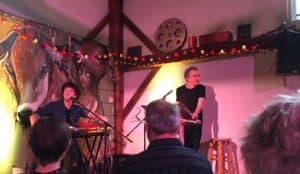
Thank you to the Monadnocker for including our show, A Journey to the White Mountains, on their top-ten fall playlist: “As we … look back on some of the year’s most impressive artistic endeavors, one in particular stands out for the way it captures the grandeur of this sweet, beautiful home we live in—New Hampshire.”
Giving a reading on Zoom can feel like speaking into the void. You never know if you’re reaching anyone. So this comment on YouTube from my appearance last week at the Thoreau Farm is good to see:
October, 2022

Backstage with Fran Lebowitz before we went on at the Capitol Center in Concord, NH. Fun evening

A new film, a short reading, wine and popcorn. Who could ask for anything more?
Canterbury Shaker Village is presenting the new film about that special place: Holy Ground by Liz and Matt Myer Boulton of the fabulous SALT Project. I’ll read from the Shaker chapter in my most recent book, Chasing Eden.
October 18, 7 pm, at the Peterborough Community Theatre. For more info email Rae at reaster@shakers.org
September, 2022
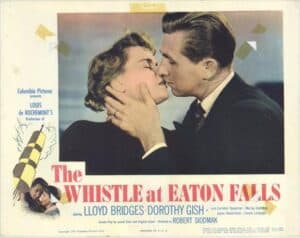
The Whistle at Eaton Falls —The Exeter Premiere
Saturday, October 22, 2022 1:30 PM 4:30 PM
Exeter High School Auditorium, 1 Blue Hawk Drive, Exeter, NH
I’ll be in Exeter on Oct. 22 for the Exeter premier of The Whistle at Eaton Falls. It’s a 1951 movie about labor strife made by Louis de Rochemont. — the inventor of the Time magazine newsreel. Think of it as On the Waterfront — which followed it several years later — but set in New Hampshire.
De Rochemont, a two-time Oscar winner, was famous for making the March of Time newsreels everyone saw at the movies before the main feature. In those pre-television days, this is where people first saw Hitler preparing for war as early as 1935, sharecroppers picking cotton in the South, the Dust Bowl, a New Orleans Jazz Band, and Franklin Delano Roosevelt being sworn in for his four terms in office, in reports mixing staged scenes with actual footage. (“It’s terrific,” said Time’s chief Henry Luce when he viewed the first reels, “but what is it?”)
He was an imposing figure. A non-stop worker “with a shock of disorderly brown hair and the haggard look of an overworked city editor, he fairly explodes with impatient energy,” said Reader’s Digest magazine. “Sleep and rest don’t figure in his schedule,” said an associate. “He turns every job into a major adventure and all the time he talks your ear off about some new enthusiasm.” Most of all, he had “velocity, a gigantic, unmodulated kind of energy” that was like “a maddened elephant crashing through the underbrush at Time, Incorporated,” said film historian Raymond Fielding.
De Rochemont’s films used a documentary style. They were “dramas from real life.” He filmed The Whistle at Eaton Falls in Exeter, Dover, and Portsmouth, New Hampshire, and in Boston.
This is a newly-restored print that captures the rich texture and deeply-shadowed scenes,
Please join the Exeter Historical Society, Keene State College Special Collections & Archives, and the Louis de Rochemont Heritage Films, Inc. for the Exeter, New Hampshire, premiere. The movie, stars Lloyd Bridges, Ernest Borgnine, and Dorothy Gish.
After the film, there will be a discussion between filmmaker, professor and historian Larry Benaquist and New Hampshire author Howard Mansfield followed by a Q&A about the film.
The event is free, however, donations are appreciated.
Here’s the trailer: https://youtu.be/Z1R22HMlrEs
August, 2022
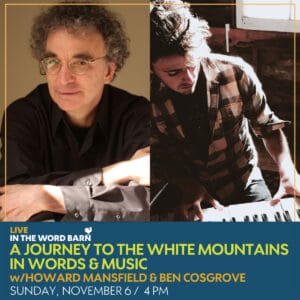
Our next performance of A Journey to the White Mountains in Words & Music is Sunday, November 6, in the late afternoon, 4 to 5:30 p.m., at the Word Barn in Exeter, N.H. Tickets and directions are available here.
Other upcoming shows:
November 12 — House concert, Dublin, NH
April 14 — The Showroom, The Colonial Theater, Keene, NH.
June, 2022
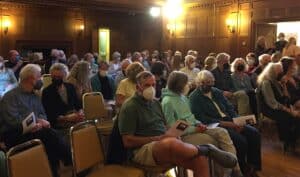
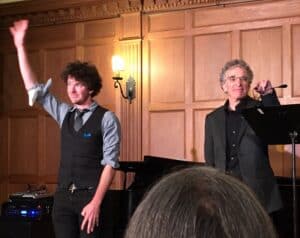
A warm reception at Bass Hall. Ben Cosgrove on the Steinway grand – and me reading – captivated the audience. Here’s everyone arriving, and us taking a bow. As for the performance, I have no pictures, so you’ll have to imagine that. A big thank you to everyone who was there.
April, 2022
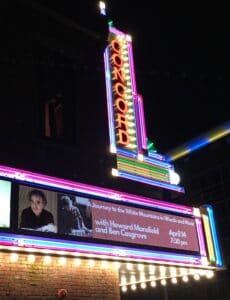
A great night at the Capitol Center for the Arts. We received a standing ovation. Sending it right back to you friends — thank you so much for being there with us for the debut of A Journey to the White Mountains in Words and Music.
The next show is June 4 at Bass Hall (Monadnock Center for History & Culture) in Peterborough, NH, 7:30 pm. For tickets click here.
And we’ll also be at the Word Barn in Exeter, NH, November 6.
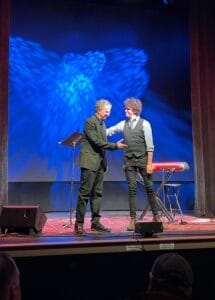
March, 2022
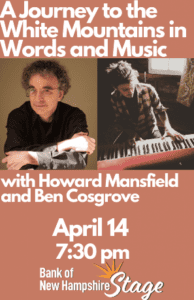
I’ve been working with a brilliant composer to set part of my latest book, Chasing Eden: A Book of Seekers, to music and bring it to the stage.
I’ll be performing A Journey to the White Mountains in Words and Music at the Capitol Center for the Arts in Concord, NH, on Thursday, April 14, 7:30 pm.
Tickets ($24) are available online: https://ccanh.secure.force.com/ticket/#/events/a0S1R00000Cc8NzUAJ or by calling the box office at the Capitol Center: 603-225-1111.
The show is about how the discovery of the White Mountains affects us to this day. Pioneering artists in the 19th Century taught Americans how to look at the wilderness. Americans were eager for the lesson, and, with guidebook in hand telling them where to see the views in the famous paintings, they followed the artists. Their art created a market for the views, filled hotels with tourists, and laid the bounds for national parks across the country.
Today’s tourists to the White Mountains may not know it, but they’ve come in search of an Eden created by a legion of nineteenth-century landscape painters.
The composer, Ben Cosgrove, writes landscape-inspired music, a spirited, Jazz-inflected piano in the tradition of Keith Jarrett. You can hear Ben at the keyboard here: www. BenCosgrove.com
Ben has held artist residencies and fellowships with the National Park Service, the National Forest Service, Harvard University, Middlebury College, the Schmidt Ocean Institute, the Appalachian Mountain Club, and the Sitka Center for Art & Ecology. He has also written for Orion, Taproot, Northern Woodlands, Appalachia, and other publications.
His fourth studio album, The Trouble with Wilderness, an evocation of nature and wildness within the built environment, was released last year. The album was featured on NHPR’s Outside/In, and was deemed one of the best new releases of last spring by WBUR. The Trouble with Wilderness has been called “beautiful and fascinating” (The Maine Edge), “deeply impressive” (Independent Clauses) and “immediately evocative and fully arresting… brimming with technical mastery and emotional capital” (Seven Days).
We have been following each other’s work for years. When I first heard Ben Cosgrove’s music, it made immediate, emotional sense. In his music I hear the restlessness of America and the broad reach of the country.
As Ben says, he has been reading my books “for years, some of them over and over. He’s able to write about local history and sense of place in a thoughtful, conversational way that somehow feels both deeply personal and ringingly universal.”
You’ve all been loyal, coming to my readings and talks over the years, for which I’m grateful. This show is quite different. I hope that the words and music bring us all closer to an elemental, powerful place.
February, 2022
I always enjoy talking to Francesca Rheannon, host of the radio show and podcast, The Writer’s Voice. She’s a sharp interviewer and a smart reader, one who dives deep into a book. I talked with Francesca about Chasing Eden: A Book of Seekers. As a bonus, in the show’s second half, she replays our 2019 talk about The Habit of Turning the World Upside Down. Listen here.

I’ll be joining the Spring lecture series at the New Hampshire Historical Society:
“Capturing Eden: An Exploration of White Mountain Art.”
The lectures are Thursdays, April 14 to May 12, 2022, at 6 p.m.
Here’s the description for the series:
In 1836, a young British painter named Thomas Cole wrote in his “Essay on American Scenery” that “Nature has spread for us a rich and delightful banquet—shall we turn away from it? We are still in Eden.” Cole was one of the earliest artists to venture into the White Mountains of New Hampshire, seeking, as he put it, “the loveliness of verdant fields, the sublimity of lofty mountains, [and] the varied magnificence of the sky.” More than 450 artists came to the region in the 19th century, armed with sketchpads, camp stools, and white umbrellas. The views they created on canvas would become emblematic of the state. The Society’s 2022 spring lecture series explores the White Mountain artists of this era and how they shaped New Hampshire.
Please note that the spring lecture series is a members-only event.
I give the second lecture, April 21:
‘We Are Still In Eden’: How Artists Taught America to See Nature
For the first artists, the White Mountains was a place awaiting their discovery, a place they would conjure. By the end of the 19th century, after the paintings and the guidebooks, it had all been seen. The landscape went from begin a testament to a souvenir, but in the process, painters like Thomas Cole and writers like Thomas Starr King grappled with the sublime power of God and nature. Author Howard Mansfield talks about the legion of 19th-century landscape
The other lectures:
Lecture 1 (April 14): Professor Inez McDermott (Art History, New England College) giving an introductory lecture about White Mountain art, Samuel L. Gerry, and his contemporaries
Lecture 3 (April 28): Professor Marcia Schmidt Blaine (History, Plymouth State University) speaking on women artists in the White Mountains
Lecture 4 (May 5): Professor Dona Brown (History, UVM) talking about the development of the White Mountains as a tourist destination and the role that White Mountain artists played in that development
Lecture 5 (May 12): Mark Mitchell (Holcombe T. Green Curator of American Paintings and Sculpture, Yale University Art Gallery) talking about American landscape painting and how White Mountain art fits into that larger context.
Join The NH Historical Society. I’d love to see you there.
December, 2021
Looking good at the Harvard Book Store.
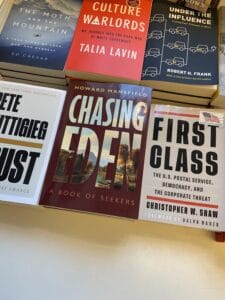
From an interview I did with Authority Magazine, online here. One Q & A:
How do you define “Leadership”? Can you explain what you mean or give an example?
The people we admire are the ones that have a wholeness about them. They are committed in their every action to something they love. That’s true leadership. They don’t necessarily advertise themselves, but people sensing this wholeness seek them out.
November, 2021
Audio books are now available for Chasing Eden, and Summer Over Autumn. I read both of them at the nearby Loud Sun Studio in Jaffrey, New Hampshire. Download them wherever you get your audio books.
Two of New England’s best independent booksellers pick their favorite new books for fall. Chasing Eden is on both their lists:
“… Writer Howard Mansfield has pursued some active chasers and written a fascinating account of individuals and groups that made attempts to create an Edenic life here on Earth. They range from the Shaker Community in Canterbury to an early 20th-century Black doctor in Keene who crossed over and back between races. And not to be missed is the powerful chapter on the 40 thousand former slaves offered ‘40 acres and a mule’ right after the Civil War. An Eden promised but not delivered.”
— Willard Williams, owner, The Toadstool Bookshop, Peterborough, NH
“I will second Willard’s nomination of Howard Mansfield’s new book, Chasing Eden: A Book of Seekers. Millenarian dreamers are as American as apple pie, and form a fertile subject for Howard Mansfield as he once again grapples with our history and makes it feel contemporary. Mansfield is one of the few writers working today who could be called a public intellectual — like Edmund Wilson in years gone by, or Ta-Nehisi Coates and Masha Gessen today, these are thinkers who are not affiliated with universities whose interests are wide-ranging, covering broad swathes of our cultural and literary landscape. As always, Mansfield’s fertile mind entertains as much as it educates in this fantastic new book.”
— Michael Herrmann, owner Gibson’s Bookstore, Concord, NH
October, 2021
I enjoyed talking to Jim Braude and Jared Bowen on WGBH radio’s Boston Public Radio show. Listen here. Scroll down to find my part of the show.
Jim Braude likes the book. He said,“This book is just spectacular. Everybody should go out and buy it.”
Here’s an introduction to my new book, Chasing Eden, in 2 minutes and 38 seconds:
September, 2021
Photographer and one-time New Hampshire Artist Laureate Gary Samson came by with a gift, a copy of New Hampshire Now, his dream project to have close to 50 photographers capture the glories and contradictions of NH. They worked for three years, including the long, long year of lockdown and protest, 2020. I was honored to write the introduction. NH Now will be out in October with exhibits all over the state. Thanks are due to the New Hampshire Historical Society and the New Hampshire Society of Photographic Artists for supporting Gary’s dream.
August, 2021
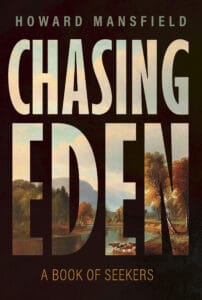 An excerpt from my forthcoming book, Chasing Eden, is in the August issue of New Hampshire Magazine. Editor Rick Broussard says:
An excerpt from my forthcoming book, Chasing Eden, is in the August issue of New Hampshire Magazine. Editor Rick Broussard says:
“This issue features a number of people who have learned to “listen” with more than just their ears. Most notably, one of my literary heroes, Hancock’s Howard Mansfield, has offered us the first chapter of his new book (due out in October) to excerpt for this issue.
“Mansfield’s head seems to contain an app like the one I use to identify birdsong, but his algorithm is set on detecting something more subtle. Mansfield assimilates the ambient world of towns and people and work and play, and detects the deeper notes that guide him to stories. He follows the invisible connective tissues of communities and finds links to a past that never really went away. He translates messages that our world is apparently always chirping to anyone who cares to stop and pay attention. I’ve learned that Mansfield’s words tend to impart a touch of his ability to the reader, so don’t be surprised if, once you discover him, you start to pick up on those deeper notes all around you.”
February 2021
It’s gratifying when a book you have written finds readers, and especially so when that book has been out for a while. My first book, Cosmopolis, published in 1990, has been picking up some new readers lately. It has been noted by scholars, most recently in The Routledge Companion to Twentieth and Early Twenty-First Century Urban Design: A History of Shifting Manifestoes, Paradigms, Generic Solutions, and Specific Designs by Jon Lang, published in September 2020.
September 2020
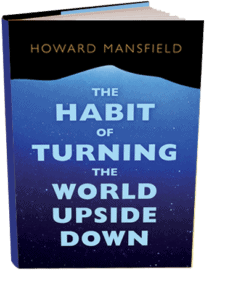 Prof. William Stroup at Keene State College has assigned The Habit of Turning the World Upside Down for a course he is teaching this fall, “Reading and Writing in Place.” I’ll be visiting by Zoom.
Prof. William Stroup at Keene State College has assigned The Habit of Turning the World Upside Down for a course he is teaching this fall, “Reading and Writing in Place.” I’ll be visiting by Zoom.
I’ll be speaking at this Zoom conference about archives:
November 2019
Back in Print: At the End of Life: True Stories about How We Die. I contributed an essay, “Waiting (to go Home)” this collection of essays edited by Lee Gutkind,
The publisher, Creative Nonfiction Books, says “this is quite a terrific book, a moving and informative collection of narrative essays about how people die in the American healthcare system, with stories from the points of view of a 911 telephone operator, parents writing about losing a child, a grief counselor, and a physician losing a patient, among others. And it’s got a wonderfully thoughtful introduction from Francine Prose.
My essay is about nursing homes and hospitals. From the essay:
You can’t deny the Godot-like absurdities of the nursing home. It’s a vast diorama of waiting.
In the dayroom two men are talking about the Marx Brothers.
“He could really play the harp,” the first says of Harpo.
“He couldn’t talk,” says the second man.
“He could talk.”
“He couldn’t talk.”
They stumble along over this until the first man finally explains that Harpo could talk, but didn’t as part of his act. Then he says, “There were five Marx Brothers.” He starts to name them – Groucho, Harpo, Chico… and after awhile he comes up with Zeppo. But the fifth? They start the list over and are stumped.
I’m sitting across the room with my dad. He’s in this nursing home—a different one than my mother’s —after a bad fall for a few weeks of physical therapy. We’re paying his bills. The two men are still trying to name the fifthMarx Brother. I call over:
“Gummo.”
“Dumbo?”
“Gummo.”
“Dumbo?”
“Gummo. He dropped out early.”
“Gummo? I don’t remember him,” and he waves his hand to the side—the classic New York gesture: eh, take it away. Having an answer has disappointed them. I feel like I have taken a bone from a dog. Who knows how long they could have pursued the mystery of the forgotten Marx Brother? They have all day, and the next.
They shift in their chairs, are quiet, and then find something to complain about. This warms them right up again.
October 2019
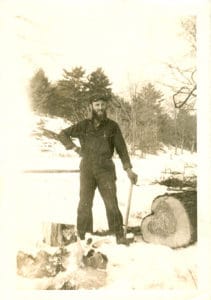
Fifty-five years ago, farmer Romaine Tenney set fire to his barns and farmhouse, with himself inside, after his land was seized by the state to make way for Interstate 91. Now as Vermont is planning a permanent memorial, I was a guest on Vermont Public Radio’s Vermont Edition To talk about this chapter from The Habit of Turning the World Upside Down. Listen here.
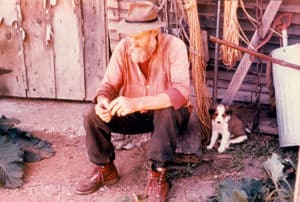
August 2019
The Same House, Twice. I loved learning about Grace McEniry’s architecture project at Harvard’s Graduate School of Design.
“In this cabin intended to break down and wear out, the material and assembly logic is legible and clear to make renovation and repair part of the original concept. The project is meant to reference an old riddle: “I know a farmer who says he has had the same ax his whole life—he only changed the handle three times and the head two times. Does he have the same ax?”* How would this cabin be the same one hundred years from when it was built? I hope this project demonstrates an understanding of OSM as part of a continuum of people and places that allows for adaptation to life in one cabin over time …. *Concept and quote from: Mansfield, Howard. The Same Ax, Twice: Restoration and Renewal in a Throwaway Age. University Press of New England, 2001.” You read more about the house here.
April 2019
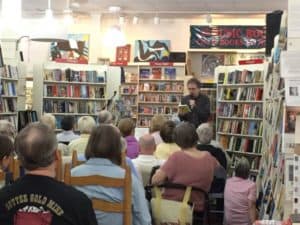
My favorite bookstore is in the next town, The Toadstool Bookshop in Peterborough. It’s a thriving independent bookstore where I’ve seen many authors read. It’s where I always kick off my book tours because there will be a large turnout and thoughtful questions.
Willard Williams, who opened the Toadstool in 1972 with his wife Holly, told the Monadnock Ledger-Transcript in an interview about the many writers who have visited his store:
Q: Over the years, what was the most memorable speaker and how did the audience respond to them?
A: I don’t want to slight anybody who didn’t, but certainly our most successful ones were Howard Mansfield and Sy Montgomery. They’re a couple who live in Hancock, and they’ve each written different kinds of books. Both of them, they’re lots of fun and lots of people come to hear them, too. They give great presentations….”
Thank you Willard and Holly for such a vibrant, important part of our community.
March 2019
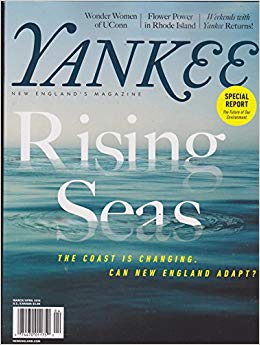
March 2019
I am honored that one of my stories is a finalist for the City and Regional Magazine Awards (CRMA). The story, “Rising Seas,” was Yankee’s cover for March/April 2018. The CRMA said: “This moving report succeeds where many climate change reporters fail by engaging our emotions in a small snapshot of the world’s biggest story. This is powerful, outstanding writing.”
From the Living on Earth interview:
When I was in school, they would roll down these maps in front of the classroom. You know, a big map of the West, and you’d see the Louisiana Purchase, which is shaped like a big lamb chop, almost. And then you’ve got, you know, Texas — and then there’s this little flap of land or the end of the liver, as it was called it in its time. That’s the bottom of Arizona and New Mexico. That’s the Gadsden Purchase. It happened during the Franklin Pierce presidency, 1850s. It was bought after the war against Mexico, and it was bought so there would be a southern route for the Southern Pacific Railroad. It was completely a railroad deal.
But here’s the thing about it. I went out to walk on the reservation of the Tohono O’odham. They’re beset with a lot of problems, high diabetes rate, high poverty rate, and the desert museum, the Arizona Sonoran Desert Museum out there was having a walk to reestablish traditional diets. So, I walked with them a few days. And I’m as I’m walking along, I realize, Oh, my God, I’m walking in the Gadsden Purchase! And I thought, well, that’s really foolish. But on those old maps, there were no people, it was a blank space! But to Tohono O’odham, it’s holy space, it’s holy land, their sacred peak is there. But to us, it’s a blank space on a map, a way through to go someplace else. So, you have two different views of land: somebody’s land deal, and it’s somebody holy land. And there’s that clash.
February 2019
Two new interviews about The Habit of Turning the World Upside Down are now online. I talked to Steve Curwood, the host of Living on Earth. Listen here or read the short transcript. And I enjoyed my talk with Francesca Rheannon, the host and producer of the Writer’s Voice podcast .
December 2018
I get my very own state holiday. On New Hampshire Public Radio’s daily talk show, The Exchange, I was awarded a state holiday:
Dan Chartrand, owner of Water Street Bookstore: Sy has said—I’ve heard her say in public—that a lot of the underpinning and the theory behind her work preserving and appreciating the animals that live on this planet with us, is really based on her husband Howard’s work. Howard has written extensively about preservation and replacement. And why, when his books come out, don’t we all stop, in the state of New Hampshire, take a state holiday, and all read it at the same time? We should have a state book club. Every time Howard publishes a new book.–Dan
Michael Herrman, owner of Gibson’s Bookstore: We could call it Howard Mansfield Day
Dan: Exactly! This guy is the most under-read author in NH and he’s one of the most important authors.
Michael: It’s because he’s so hard to categorize.
Dan: Exactly!
Host: What shelf do you put Howard Mansfield on?
Dan: Let’s start with The Habit of Turning the World Upside Down. Let’s everyone just take a break, read this amazing book.
Oh, and I’m pleased to report that both booksellers picked The Habit of Turning the World Upside Down as one of the best books of the year.
Robert H. Thomas is a land use, eminent domain, and appellate lawyer who practices in Hawaii. He is also a visiting professor at William & Mary Law School in Williamsburg, Virginia. Thomas really likes The Habit of Turning the World Upside Down. It’s “a great read, and a perfect gift for those on your holiday lists,” says Thomas.
Thomas interviewed me for his widely-read blog on land use, property, and takings law, inversecondemnation.com. We had a lively conversation. You can tell that Robert Thomas really enjoys his work. Listen to the interview here or here.
I enjoyed my visit with Peter Biello on NHPR’s show The Exchange. Listeners called in with good, challenging questions. Listen here.
September 2018
The first review is in for The Habit of Turning the World Upside Down:
The always eloquent Mansfield conducts an evocative foray into the history of American property rights in this slim but enormously prescient title. In a series of related essays, he takes readers from the arrival of the Europeans (who “defined the Indians by what they didn’t own”) to George Washington’s land speculation career with the Adventurers for Draining the Dismal Swamp (a slave-labor-based company attempting to drain a Virginia swamp) to contemporary struggles defending private property rights against pipeline and transmission line developers. While he crafts strikingly evocative portraits of the people he profiles (his essay on farmer Romaine Tenney, who sacrificed everything to fight against the interstate barreling across his land, is simply unforgettable), it is the scalpel like precision with which Mansfield homes in on the relationship between Americans and the land that proves most perceptive. He accepts all the complexities of his chosen subject yet is gifted with an unerring eye for the true heart of the matter. “American property is always in motion,” he writes, but it is also “our anchor and our North Star.” Who decides the best use of property? Who truly owns it? Powerful insights live on these pages, and Mansfield’s observations matter now more than ever.
— Colleen Mondor, Booklist (starred review)
My new book has received its second review:
There comes a point early on in the reading of Howard Mansfield’s newest book The Habit of Turning the World Upside Down when you realize that you thought you understood what “property” meant, but in actuality, you didn’t. A point when you say to yourself: “Ok, I’m listening to what this guy has to say.” This book is a path-clearing work; the idea of property as most of us understand it has been occluded by so many branches consisting of conflicting ideas, legalese, lawsuits and the idea of eminent domain that one needs a person like Mr. Mansfield to clear away the brush and show us the path again. He does this admirably well in this, his tenth book.
… All of his narratives are clear and concise, and most importantly, eye-opening. Even life-changing… At 128 pages, The Habit of Turning the World Upside Down is a quick read, but it demands a thoughtful read. Parts of it should be read to your children so they understand the incertitude of what they are taught in school. Property is a fluid thing; it can never be truly controlled, as the native peoples of North America tried to tell the first Europeans who landed in North America. Five stars and highly recommended reading.
— The Miramichi Reader
July 2018
I enjoyed my visit to the Canaan Meetinghouse Readings series which is run by Phil Pochoda. Phil is a retired publishing veteran (Simon & Schuster, Prentice Hall Press, Pantheon Books, University of Michigan Press, and the University Press of New England).
Thank you Phil for this fine and funny introduction:
I’ve always been fascinated by the work of field archaeologists who systematically and painstakingly sift through ruins or suspected ruins, digging with small implements, even using tiny brushes to clean delicate items. Then they attempt to make sense of their discoveries, and often manage to extrapolate from the unprepossessing shards or foundations or debris to the nature of the whole physical, social, cultural and political milieu and the lives of the inhabitants there years, centuries, or millennia ago.Howard Mansfield has always seemed to me a New England cultural archaeologist in just this sense, the Heinrich Schliemann (who excavated and discovered Troy) of our whole region, relentlessly digging through thoughtlessly or intentionally discarded remnants of past lives for clues to the sensibility, the values, the concerns of those who preceded him in this territory, leaving evidence that was unintended by them and generally disdained or misperceived by almost everyone else now and earlier, including, or especially, professional or academic New England historians.
Emily Dickinson famously instructed us to “tell the truth but tell it slant”, and Mansfield, whose writing is invariably evocative as well as descriptive, has long realized that our predecessors told their truths “slant”, not primarily through written records, but through inadvertent material remains. His evidence comes from how houses and rooms were constructed, furnished, decorated, expanded, and neglected; from what was and what wasn’t deposited in the many local historical museums that exist in so many towns, with collections often uncurated and uncataloged; from the fields and foundations and cemeteries that contain stone monuments and stone boundaries; from trees planted and trees memorialized in the town commons, fields and barnyards; from tools repaired and tools discarded; from many kinds of sheds built and sheds deteriorated. These are commonplace things not intentionally hidden but, as Howard has demonstrated repeatedly, their meanings are often hidden in plain sight. But, fortunately for us, he has painstakingly deciphered their languages, and is able to read from them – and read for us — the lives that made and used and repaired and discarded these particular objects, these personalized living spaces, these idiosyncratic enclosures.
Nor is this a disinterested quest: he delves so deeply and interprets so precisely because it matters to him profoundly how lives here have been lived, how lives are lived now, and even, though conveyed very gently, how lives should be lived. And his good news is that so many lives here have been lived well; have coalesced around appreciation for things well made, cared for, repaired and repurposed.
Howard’s originality of vision as well as originality of language was on full display in an early book, In the Memory House, published in 1993, for which he trekked to and through far too many dusty historical museums in far too many small New England towns to ascertain what got deposited and what didn’t, who was enabled to make deposits and who wasn’t, amounting to a diagnostic manual of local material memories and amnesia and the cultures they can reveal to an astute reader.
The Same Ax Twice (2000) took a different tack to much the same ends: this time looking at how and why common items from the past have been recovered, restored, renovated, and reused, items like tractors and axes, as well as buildings and community, all contributing, as Mansfield points out, in the sense of the Jewish Kabbalah, to a collective mending of the world.
The social sources and meanings of time itself was the central concern of Turn & Jump: How Time and Place Fell Apart (2010), in which Howard demonstrated the original local, regionally conflicting, nature of time, of the many disparate times in adjacent communities before the railroads forced the imposition of the standardized times necessary for the emerging regimented industrialized and bureaucratic economic order.
The title of his recent book, Dwelling in Possibility: Searching for the Soul of Shelter (2113) informs us of its both humble and profound mission: to look closely at the houses and dwellings people have constructed and inhabited in order to determine what gives and what doesn’t give human shelters a life, what does and doesn’t create a haven, a soul.
Which brings us (though time forces me to skip other books that I adore) to the new book from which Howard will read this evening, Summer Over Autumn: A Small Book of Small-Town Life, in which Howard turns his attention from the deeper past of many of his previous books to the present of his adopted town of Hancock, NH where he has lived for thirty years with his wife, the great natural history writer, Sy Montgomery. Coincidentally, Hancock has been claimed by some to be the model for Thornton Wilder’s Our Town, but in Howard’s work, though infused with sentiment, you find none of the sentimentality of that play or of so much of the corny, misinformed, or propagandistic writings about small town New England life. Howard will present this new gem of a book himself, but on full display in it are all the qualities of close attention, conviviality, generosity, and wry wit that we have now come to expect. And we are never disappointed. As a great literary critic and stylist, Guy Davenport, wrote: “Howard Mansfield has never written an uninteresting or dull sentence.”
As for me, if they ever decide to restore the famous fallen granite visage of The Old Man of the Mountain — which they won’t, they can’t, they shouldn’t — my vote for its new face would be Howard Mansfield’s. There is no one I’d rather have permanently looking out upon us and looking out for us, perceptively, benignly, wisely. (Not least, I’d I love so see those eyebrows done in granite.)
Surely I don’t have to say anything more for you to understand what a great pleasure it is for me to introduce my old friend, Howard Mansfield.
May 2018
I am honored and surprised to find In the Memory House on writer Jim Rogers’ list of ten books that have made an impact on him. Jim Rogers wrote: “Not sure why I first picked up Howard Mansfield’s book In the Memory House (1993), but it is a jewel – a lyric meditation on the beauty of the nearby, the endurance of memory, and (this sounds way more ponderous than it is) on the phenomenology of living in a place, in his case rural New Hampshire. Howard Mansfield is a treasure whose essays and books deserve to be much better known.”
On Facebook, other readers joined in. The writer Rebecca Rule said, “It changed my way of thinking about old stuff. And I think a lot about old stuff.” New England College professor of art Inez McDermott said, “This book mattered to me, too. It got me out of the academic approach to art history and I began to teach, think, research and write in a more “holistic” (for lack of a better word) way.” And Leslie Rosoff Kenney said, “I also loved this book. Thank you, Howard.”
April 2018
Thank you Fritz Wetherbee for telling your loyal New Hampshire Chronicle viewers about Summer Over Autumn. Here’s what Fritz said:
Hands-down, the finest writer of Yankee life today is this guy, Howard Mansfield. Howard Mansfield sees things differently than most of us, and he points stuff out that most of us miss. Robert Frost had this ability to look at something familiar, say a leaf or a tuft of flowers and find a depth of meaning that, until we read the poem, eludes us. Howard Mansfield has written 13 books and lots of articles. But my recommendation, if you are not familiar with his output or style, is this: it is a modest book entitled Summer Over Autumn. This book is funny, this book is profound. I found myself saying, ‘darned if that isn’t true,’ a number of times. Characters here that anybody who has lived in a New England town for any time is familiar with; people who care, people who are selfish, people doing brilliant things, people doing dumb things.
Let me read a few sentences, give you an idea of what this guy does. “What we find in ruins,” he writes, “is a kind of melancholy. Free of clutter, free of us, a house gains stillness. It is a kind of stillness that we find on old country roads. It’s the skull under the skin, the skeleton, the death inside us. It’s the clock ticking our days away. We lack a good word for this kind of going away, this decay in which something else is present. Ghost or ruin doesn’t convey it. The Japanese call this feeling mono no aware, defined as the bittersweet sadness of things as they are, or a sensitivity to the fleeting beauty of the world. ‘You accept it, you even in a small way celebrate it….’”
Is that good or is that good?
Wish I had more time. Howard, by the way, lives in Hancock with his wife, another wonderful writer, Sy Montgomery. Talk about a power couple.
Watch this segment of New Hampshire Chronicle here.
January 2018

Every Monday, The American Conservative’s editorial staff, along with some regular contributors, share with their readers what they have been reading. One of those books is The Bones of the Earth:
“Addison Del Mastro, assistant editor: I’ve been reading The Bones of the Earth by Howard Mansfield. I discovered this book while I was doing some research on the retail history of Route 22, one of New Jersey’s iconic post-war highway strips. It happened that Mansfield wrote a couple of pages about Route 22 here, and the kitschy midcentury signs and buildings there, some of which survive today.
“The Bones of the Earth is not, however, so much about historic preservation or suburbia, as it is about cultural memory and how we think about the past. Mansfield visits some old stone bridges in New England and ponders how they were built with no mortar, by masons who could tell from the shape of a stone exactly where in the bridge it needed to go. He also wrote about a tradition sparked by the now-defunct Boston Post, in which the paper distributed gold and ebony canes to the oldest residents of several hundred New England towns, and stipulated that upon death, the cane would be transferred to the next oldest resident. At the time of its writing in 2004, a handful of towns still participated in the tradition.
“When does a corporate sweepstakes like that turn into a genuine tradition? When does a faded neon sign of a smiling anthropomorphic bowling pin on an ugly highway strip meld into the nation’s cultural patrimony? Terms and ideas like “culture,” “historic preservation,” “the past,” and so many more have no clear definition and are based on many underlying assumptions. Mansfield wades into all of this to great, thought-provoking effect here.”
December 2017
Summer Over Autumn has been chosen by Water Street Bookstore in Exeter, N.H., as a Top 12 Nonfiction Book for 2017.
November 2017
Summer Over Autumn Leaf Contest. The winners are in!
A word from our judges (the author, a naturalist, and an artist):
“Dear friends, judging was rough. All the leaves sent in were both beautiful and poignant, and many were very creative: leaves under water, leaves on rocks, leaves with machinery, with feet, with ears, and even one with a (darling!) baby rat. All reminded us in some way of the cover leaf–and beautifully expressed the Summer Over Autumn demi-season that gave the title to the book. We want to thank all the contestants!”
1. Most poignant: “Prayer Flags” by Tianne Strombeck
2. Most beautiful: “Lazy Leaves” by Rana Williams
3. Most like the leaf on the cover: “Mid-September: Transition Time” by Dan Millbauer
September 2017
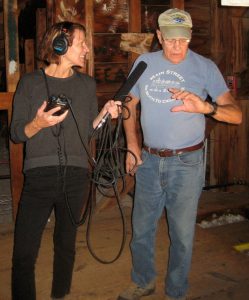
Hancock’s Bob Fogg makes his radio debut. Virginia Prescott from NHPR’s Word of Mouth interviews Bob about winding the Hancock meetinghouse clock for 50 years. Bob is in my new book, Summer Over Autumn. We’re both on Word on Mouth. Listen here. Bob is right at the start, and I come in at about 21:00 for a short interview.
Summer Over Autumn Leaf Contest
To celebrate the demi-season between summer and fall, that lovely time of year Howard Mansfield describes in his new book Summer Over Autumn: A Small Book of Small Town Life, we’re holding a contest!
There will be three local prizes for three categories of the best “summer over autumn” leaves and all winners receive a signed copy of the book! The prizes and full contest details are below:
-
- 1st Prize: For the most poignant Summer Over Autumn leaf$50 gift certificate towards dinner at the Hancock Inn
- 2nd Prize: For the most beautiful Summer Over Autumn leaf$25 gift certificate towards lunch at Fiddleheads Cafe
- 3rd Prize: For the leaf most like that on the cover of Summer Over Autumn$10 gift certificate towards coffee/treats from The Hancock Market
Monday, November 21, 2016
Sheds – the TV show. Watch Monday for a short segment on Chronicle at 7:30. WCVB, Channel 5 in Boston or online streaming live. http://www.wcvb.com/chronicle
Saturday July 23 ~ Tour de Sheds 2016!
“Where I live,” opens Sheds, a new book by Howard Mansfield with photographs by Joanna Eldredge Morrisey, “we really have only one kind of building, old and new, big and small: the shed. From woodsheds to barns, to houses, meetinghouses, and covered bridges, they are all sheds.”
Through a fundraiser for the Hancock Town Library, locals and visitors can tour a variety of sheds in Hancock and environs on July 23. The event begins with a brief talk by Mansfield at 11 a.m. at the library, where the shed tourists will be provided with a copy of the book and a map to seven sheds. The sheds will be staffed by docents (aka “shedsters”) and open for viewing until 3 p.m. Tour participants are invited to meet up at the Hancock Inn at 3 to enjoy a Shed Brown Ale.
The tour includes a range of structures, from a sugar shack to a barn to a sculptor’s studio to carriage sheds – and then some. Tickets are $25 and include the talk, the tour, and a copy of the book, which is priced at $25.
March 2016
Sheds is 2016 Forward Reviews Book Awards finalist in the photography category. Congratulations Joanna Eldredge Morrissey and the book’s designer Henry James. All those photo treks really paid off.
Category winners will be announced at the end of June.
January 2016
 Some well-intentioned folks are issuing dire warnings that fireplaces should be outlawed. One crusader says that having a wood fire is like having a diesel engine idling in your house. I suspect this man wouldn’t know a dry cord of wood even if it were dumped on top of him.
Some well-intentioned folks are issuing dire warnings that fireplaces should be outlawed. One crusader says that having a wood fire is like having a diesel engine idling in your house. I suspect this man wouldn’t know a dry cord of wood even if it were dumped on top of him.
All of this continues the long assault against the hearth, which I wrote about in my last book, Dwelling in Possibility. Jennifer Graham, a reporter for the Deseret News has done a good job presenting the concerns of various health advocates, and my reply about what we may lose:
If the rest of the country goes the way of Montreal, New York City and Berkeley, something essential will be lost, says Howard Mansfield, a New Hampshire author whose 2013 book “Dwelling in Possibility” defined the hearth as the heart of a home.
“When we lose the hearth, we lose the central gathering place of a home; we lose the shadows, the intimacy, the storytelling, the focus. We lose something that gives us permission to slow down,” said Mansfield, noting that the Latin word for “focus” is “hearth.”
Fire, Mansfield said, is our most ancient connection, a seemingly stable link between modern humans and their earliest ancestors. When humans moved inside, they brought the campfire with them and installed it in fireplaces and wood stoves. But the electric light and the furnace both freed families from cold and darkness and dispersed them to separate spaces, and nothing has quite replaced the fire as a gathering place, he said. (Except maybe the TV.)
“There is nothing like a wood fire. It makes the whole house feel different,” he added. “That’s a lot you’re asking people to give up.”
November 2015
Chronicle, WMUR-TV’s evening show, has done a fine preview of the Sheds photo book which will be published this March. Watch the short show.
I’m glad to see that Harvard Prof. John Stilgoe is using Dwelling in Possibility once again in his course this fall: Studies of the Built North American Environment since 1580. The book seen just above, Landscapes and Images, is by Stilgoe and it’s terrific. Thanks to Judith Copeland for the photo from the Harvard Coop.
June 2015
I am trying something new. I have published a story and photos on Atavist. Veterans Memorial Island is a story of the collision between peace and war, the American Dream and protest, children and parents. It’s a short memoir of a place and a time. Read it here.
40 over 40. The New Hampshire Humanities Council is celebrating their 40th anniversary by honoring 40 New Hampshire-based people who have “demonstrated what it means to create, teach, lead, assist, and encourage human understanding.”
I am honored to be among a group including poets Donald Hall and Charlie Simic, and filmmaker Ken Burns.
This is what the Humanities Council said:
“Howard Mansfield loves NH’s people. His writing connects everyday objects and the people who used them to what is meaningful in our world. Whether it is a simple axe used by a woodsman, or the hearth inside our home, or what we choose to have in our town historical societies, Howard illuminates the everyday with meaning. His words tell the stories of the common person and how they lived and constructed their lives in our state’s history. Howard not only gives voice to the people of our past, he gives of himself to the people here and now. Howard has served on historical societies, preservation groups and town committees. He is always willing to talk and share his insights with people through libraries, community centers and speaker series. He tells stories that make people laugh and feel ready to fall in love with their town’s own history. His book titles include, In the Memory House, The Same Ax Twice: Restoration and Renewal in a Throwaway Age, The Bones of the Earth and Dwelling in Possibility: Searching for the Soul of Shelter. Howard is a gem in our granite landscape.”
Now in paperback: Cosmopolis: Yesterday’s Cities of the Future from Transaction Publishers.
November 2014
 It was pleasure to visit Laura Knoy at NHPR to talk about Thanksgiving on The Exchange, along with Emelia Attridge, staff writer with the Hippo Press, and Gerri King, social psychologist, former family therapist, and author. You can listen to the show here.
It was pleasure to visit Laura Knoy at NHPR to talk about Thanksgiving on The Exchange, along with Emelia Attridge, staff writer with the Hippo Press, and Gerri King, social psychologist, former family therapist, and author. You can listen to the show here.
A few of my comments about going home for the holiday:
“Sarah Josepha Hale [Thanksgiving’s founder] talked about Thanksgiving as a time for hearth and altar. So it’s all about homecoming. And you figure when Lincoln finally sets up the holiday it’s a time when there’s a great hunger for homecoming because the country is rift apart.
“And I think underlying it all, there are two stories of homecoming that we run into at Thanksgiving. And they mix and they collide depending on where we are in our lives.
“The first is a story we know – Rip Van Winkle. He falls asleep in the hills for 20 years. Comes back to his native place. He’s a stranger. No one recognizes him. New lives all around him. His own home place is fallen in. Home leaves us. That’s the first thing we run into.
“And then the other story is a traveler’s tale. It’s a tale we tell on the road. Home is like the unchanging oasis. It’s never going to change. It’s where our youthful self still walks the world like some kind of spirit life. So: Home waits for us.
“So there we are at Thanksgiving and we hit these two conflicting stories: Home waits for us. Home leaves us. And I think we just ride out those emotions sometimes depending on where we are in our lives, who we’re visiting. It’s a very powerful holiday.”
TEDx — November 2014
Thank you to the throng of volunteers, organizers, techies, who put on TEDx and thank you Rosa for going lightly with the makeup and making funny faces as you looked at my hair. Each TEDx-oid (possible word? No. Tedx-ite? Maybe) — each TEDx-er was welcoming.
Watch the TEDx talk.
This is a doodle of my talk by a Tweeting Doodler that TEDx tweeted.
Meet Howard Mansfield, 2014 TEDxAmoskeagMillyard Speaker
Howard Mansfield is a writer; one that writes of what we once knew and somehow lost along the way. When we read his words, we harken back to what we held dear, now somehow lying dormant for far too long. His writing resonates deeply, and we begin to wonder how we could have let go of what once mattered so much. He takes nothing for granted, and his readers reawaken to a very different world—their own world—viewing it in a new, yet familiar, way.
I am happy to report that I’ll be speaking at this year’s TEDxAmoskeagMillyard. The theme is “Connection.” “From our deepening understanding of the world’s interdependent ecosystems to an appreciation of the potential of intellectual and artistic collaboration, we’ll explore what happens when we connect: with people, with place, with ideas, or with beauty. If the Renaissance showed us the importance of the individual, our modern world highlights the importance of connection.”
The other speakers are:
Jessica Higgins, U.S. Army veteran and advocate.
Deepika Kurup, Clean water advocate.
Emilie Aries, Gender equality and political activist.
Dr. Louise Pascale, Afghan children’s music advocate and educator.
Randy Pierce, Explorer.
Tania Simoncelli,Gene defender.
Manuel Hernández Carmona, ESL innovator, author and educator.
Joel Christian Gill,Artist, storyteller and educator.
May 2014
A Moveable Garden is a thoughtful blog by a gardener who has had her hands in the soil for almost 25 years. “I’ve spent countless hours just looking at my plants, at the insect and bird activity on, in, and around them, and appreciating both the simplicity and complexity of habitat.” Right now this gardener is reading Dwelling in Possibility and thinking about it while writing about the essence of Louis Kahn’s great Salk Institute. I am honored to find my book in the company of Kahn and a good gardener. Read the blogpost from a Moveable Garden here.
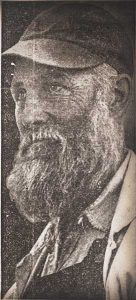
I am honored to be a part of a reason to celebrate. Yankee Magazine is a 2014 National City and Regional Magazine Awards finalist for “Excellence in Writing” for the March/April 2013 issue, “The Power of Place.” Two of the stories in that issue are:
* My Roots are Deeper Than Your Pockets
Rod McAllister could have sold his dairy farm for $4 million dollars. But where would he be? He would have sold himself off the earth. Rod is just one of many in the North County of New Hampshire who are taking a stand against having their home cut up by the transmission lines of the proposed Northern Pass project. Read it here.
* I Will Not Leave: Romaine Tenney Loved His Farm to Death
In the Summer of 1964 a bachelor Vermont farmer faces the new Interstate highway coming right through his house and barns. A tragic love story. Read it here.
In her blog, In the Sunny Spot, Katy Noelle talks about reading Dwelling in Possibility:
January 2014
Dwelling in Possibility outsells Fifty Shades of Grey — at the Toadstool Bookshop in Peterborough, NH. In a January 6, 2014 story, Publishers Weekly reports on an ‘Excellent’ Holiday for Many Indies: “local authors, frequently published by local presses, did well across the board. At the Toadstool local authors Archer Mayor’s Three Can Keep a Secret and Howard Mansfield’s Dwelling in Possibility were among the season’s best. The latter outsold last year’s Fifty Shades of Grey by 20%.”
The Post-Hearth House. A Boston Globe 0p-ed by Jennifer Graham looks at the diminished fireplace in our homes. Graham quotes from Dwelling in Possibility: “Putting out a campfire that’s burned throughout millennia is such a significant change that we can divide the history of dwelling between Hearth and Post-Hearth.” Read her op-ed here.
Book Riot Picks Dwelling in Possibility as one of the Best Books of 2013: “Howard Mansfield writes in the dreamy prose of a poet, while discussing everything from what makes a home feel like home to the rebuilding of communities after being literally bombed, flooded, or otherwise destroyed.”
December 2013
“The best buildings are the ones we can look at every day of our lives and still see something new,” Howard says. “They keep revealing themselves and refreshing our spirit.” That’s from the fine story in Michelle Aldredge’s lively, colorful arts journal, Gwarlingo. Read her story about Dwelling in Possibility here.
Just published in paperback. Turn and Jump: How Time and Place Fell Apart. (Rowman & Littlefield) ISBN 978-1-4422-2638-8
September 2013
New Hampshire Magazine’s September 2013 issue says: “Every book by Hancock author Howard Mansfield is a cause for celebration among thoughtful readers. His granitic epiphanies are as universal as water but as precious and local as a backyard well. His latest book, “Dwelling in Possibility: Searching for the Soul of Shelter” (available this month from Bauhan Publishing of Peterborough), covers a lot of ground from an ambiguous critique of Frank Lloyd Wright to a chronicle of life in NH’s Great Ice Storm of 2008, but this opening to his chapter titled “Sheds” makes a great introduction.”
August 2013
“Go ahead and fail.” From an interview I did with Book Notes New Hampshire: Occasional notes on New Hampshire’s book community from the Director of the Center for the Book at the New Hampshire State Library:
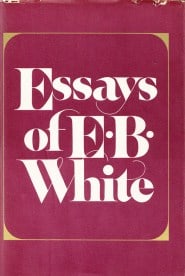 What’s the best piece of advice (writing or otherwise) you were ever given?
What’s the best piece of advice (writing or otherwise) you were ever given?
May 2012
“The tyranny of all institutions is that they control time. Everyone is on school time or airport time. We wait and do as we are told. Hospitals are like that, but the stakes are higher. The first thing about hospital time is that we never know how long we will be there. Will one test or “procedure” lead to complications? When will the doctor stop by to sign our papers so we can leave? Will we ever leave?”
That’s from my interview on the blog for the new book At the End of Life. You can read the interview here>
New paperback: At the End of Life, a collection of essays edited by Lee Gutkind, has just been published by Creative Nonfiction Books. Howard Mansfield contributed an essay, “Waiting (to go Home).”
Prof. Joy Ackerman at Antioch University New England is having her students read The Bones of the Earth and In the Memory House for the course “Making Sense of Place.” Howard Mansfield will visit the class.
New ebooks:Turn and Jump, and The Bones of the Earth are now in ebook editions for the Kindle and the Nook.
Turn and Jump has won an “IPPY:” Independent Publisher Book Awards, 2011. Silver medal, in the science category.
May 2011
Franklin Pierce University has awarded Howard Mansfield and his wife Sy Montgomery each a Doctor of Humane Letters.
Here’s what they said at Commencement, May 2011:
“Howard Mansfield
Author Preservationist Historian
Howard Mansfield embodies what Barry Lopez has called “a local genius of American landscape, one whose knowledge is intimate rather than encyclopedic and whose writing rings with the concrete details of experience.” These individuals are uncommon, and we in the Monadnock region are privileged to be able to see our home ground through his keen and generous eyes. He uncovered and celebrated the distinctive features of this place as editor of Franklin Pierce University’s Monadnock Institute of Nature, Place and Culture’s anthology of essays Where the Mountains Stands Alone: Stories of Place in the Monadnock Region. He has been a founding member of the Monadnock Institute’s advisory board since 1996.
With deep knowledge, painstaking accuracy and more than a touch of humor, Mansfield carries us back to another time through his reflections and ruminations. His words allow us to see and experience traditional ways as well as the dizzy pace of change. We see through him that time and silence are more valuable than the things we often accumulate and become overwhelmed by. He encourages us to really look at where and how we live, and to honor the old houses that are ‘brimming cups of here’ where “house, land and people seem to be breathing at the same rate.”
When he first moved to New Hampshire, he visited the historic society in his small town and observed the items that this community chose for their ‘memory house’ — a tassel from the decorations of the late President Lincoln’s funeral car, a drum that may have been used in the Revolution — and recognized “here was a glimpse of a community in the act of remembering.”
Howard Mansfield has written, edited and contributed to over a dozen books about history, preservation and architecture. He writes of the importance of restoring old ways of doing things to “import some of the things we are losing daily: silence, repose, memory,” and “make time for being here – not online, not rushing to do everything.”
Because he has reminded us of what is truly significant in our daily lives, because he has traveled back in time as far as 10,000 years to bring his readers into the experiences of the past, because he has given us stories that capture the habits and hopes of our distinct community, and because he is dedicated to restoration in our throw-away society, Franklin Pierce University is proud, on this 14th day of May 2011, to confer upon Howard Mansfield the degree of Doctor of Humane Letters, honoris causa.”
Exploring time and place with Howard Mansfield
“Author Howard Mansfield sifts through the commonplace and the forgotten to discover stories that tell us about ourselves and our relationship to the world.”
Whole Terrain | a journal of Reflective Environmental Practice
http://wholeterrain.com/2011/01/23/mansfield/
